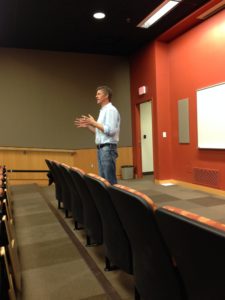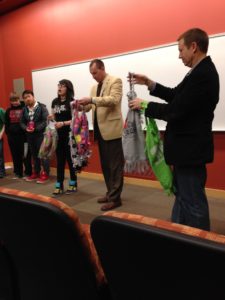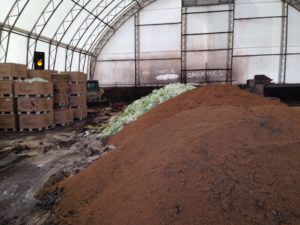By YES! Coordinator Katelyn Larsen
Students from the Westbrook-Walnut Grove (WWG) and Sleepy Eye YES! teams convened at Bethany Lutheran College in Mankato on March 4 to learn about business start-ups and entrepreneurship in the southern region of Minnesota.
Our first speaker was Ed Fahrforth, Sales Manager at LJP Waste & Recycle. When Ed started Minnesota’s first recycling company in 1989, everything had to be source separated, meaning that consumers separated their recyclables before they reached the recycling center. Twenty-six years later, consumers can put all of their recyclables into one bin, and LJP Waste & Recycle will sort it into the different components. While sorting recyclables this way is easier on customers, it often leads to contamination, especially with valuable paper fibers. Thus, LJP Waste & Recycle provides separate dumpsters for cardboard, its biggest commodity, to its commercial accounts. To further encourage businesses to recycle, LJP Waste & Recycle gives a portion of the revenue earned from recycling back to the business. Currently, LJP Waste & Recycle collects corrugated cardboard, mixed paper, glass, clothing, milk cartons, and all plastics among other materials. Ed indicated that if the company can’t recycle something through its markets, it will find another company that can.

The second speaker was Andy Elofson, Founder of PCs for People. Although Andy works full time as a social worker for Blue Earth County, he recognized a need for computer recycling before Minnesota’s e-waste bill existed. He noticed that as computers became outdated, they piled up in companies’ store rooms collecting dust. One day, he got the idea of giving a computer no one was using to a boy who was gifted with computers but couldn’t afford one. From there, the idea grew. Andy received requests from others wanting to dispose of their old computers. He provided internships to students to work on the computers and refurbish them. Soon, Andy’s vision required a warehouse, a staff, and a name. Today, PCs for People operates from Mankato and the Twin Cities, gives out 7,000 computers per year (for donations of typically $35-50 per computer), holds a laptop ‘soup kitchen’ once per month, and utilizes a 20 person staff. They have received certifications from Microsoft Office and the National Association for Information Destruction (NAID) so businesses feel secure donating their old equipment. Computers that can’t be refurbished get recycled through various partners. PCs for People continues to grow with partnerships and is expanding nationwide. Andy’s message for the students was “never be afraid to ask” because you never know what might come of your idea.

Following Andy’s presentation, Bryan Stading, Executive Director of the Regional Center for Entrepreneurial Facilitation (RCEF), and Shane Bowyer, Glen Taylor Chair of Business and Leadership at Bethany Lutheran College, presented some ideas on starting and growing a business. They involved the students from WWG who have been creating products to sell from recycled materials. WWG students presented the projects they’ve been working on: earth braids, birdfeeders from plastic bottles, handbags from t-shirts, hand-made solar lights, solar-powered battery rechargers, and lanyards from plastic bags. Presenters and students were impressed by the ideas from the WWG team, and ideas were shared to help the students market their products. Bryan and Shane indicated that the two most important aspects of operating a business are passion and making sure to pay yourself for your time.

Next the teams traveled to Full Circle Organics in Good Thunder, MN where they received a tour of the facility. In light of the new composting rule in Minnesota, food organics need to be on cement for a period of days to prevent any contamination from leaching into the groundwater. The food waste can then be transferred to the turned windrows on the facility grounds. Typically Full Circle Organics maintains an average temperature of 160° or lower (temperatures need to be at 130° or higher for 20 days). Once the compost nears completion, it is screened to remove any plastic or large materials that didn’t break down. Then, farmers and other consumers can purchase the screened compost at $25 per yard.
By the end of the day, everyone was able to take something valuable from the workshop home with them. More importantly, teams received valuable ideas to carry into their future projects.